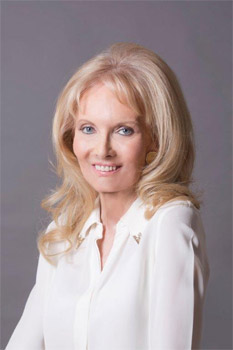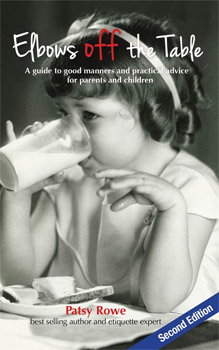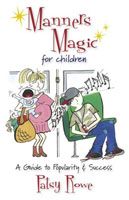Patsy Rowe Children's Manners Interview

Patsy Rowe Children's Manners Interview
Question: Why do you believe we often hear 'children today have no manners"?
Patsy Rowe: The pendulum has swung too far and too fast….. from 'Children should be seen and not heard" which was extreme and crushed social development to 'We don't worry too much about their manners, there are more important things in life they need to learn." Wrong. Manners are the oil that lubricates society. Manners, respect and consideration for others feelings are vital to bringing up well-rounded, nice-to-be- around adults. The reason we hear the cry that children have no manners is because today some, not all, but some children have no idea of the magic five: -please', -thank you', -excuse me', -pardon' & -I'm sorry'. These little words take us a long way in society and children who don't have them, who don't share their toys, who are bossy, who shuffle and look at their feet when they're introduced, who mumble and are bad sports are unfortunately children, who as adults, will have a long learning road ahead of them.
Question: How has children's manners changed over time?
Patsy Rowe: There are countless ways (and I have generalized here) in which children's manners have changed over the years but some of the most noticeable are:
Today, fewer parents encourage children to use the last name of adults when being introduced and instead are happy for them to use Christian names, so instead of 'Hello Mrs Smith" we hear, 'Hello June."
Many parents fail to insist on reasonable table manners, often because families don't eat at the table. It's all very well to lie on a bean bag in front of the TV for meals, but as adults in work situations we are invited to restaurants or work functions for a meal and not having a basic knowledge of table manners is embarrassing and leads to a lack of confidence.
Similarly, parents are often guilty of turning a blind eye to the time that youngsters spend on their phone or iPad rather than engaging directly.
There is a clear lack of respect shown by young people to older people, those figures of authority, teachers and so on, 'answering back" or 'giving lip" isn't stamped upon by parents as it would have been in the past.
Teaching children the value of money is an important life skill. Earning pocket money through house chores seems to have fallen out of favour with many families and children who don't appreciate the cost of items are less inclined to take care of them. It's a -throw away' society and this attitude starts young.
Question: Who needs to teach children manners?
Patsy Rowe: This is a no-brainer: mothers and fathers and for the lucky ones with grandparents, them too.
Question: How does the general public need to also aid in teaching children manners?
Patsy Rowe: The general public can't. It's impolite to correct someone else's manners, or their grammar for that matter. However, if the situation seems right and the child seems open to advice, it's possible to suggest to a child that it would easier to eat the peas this way, or it would be kind to hold the door open for that lady carrying the baby. So much depends on the way the suggestion is made so rather than a critical voice, a gentle helpful voice will do the trick.
Question: What advice do you have for parents to teach children manners?
Patsy Rowe: Persistence, patience and teamwork with your partner is essential. It's no good if mum says the child is not to swear if dad says it doesn't matter once in a while. Parents may feel they're harping (and they probably are ) but it's the same way children used to learn their multiplication tables at school, by repeating them. It's the way we learn a poem. By repeating it. So it is with manners, repetition and consistency and the message will finally get through.
Question: What are the first manners a child needs to be taught and when suit this begin?
Patsy Rowe: The very first words children will learn easily and quickly are -please' and -thank you' even if they're mispronounced. And these can be learned as soon as the child wants something: a toy for instance. They will soon catch on that -please' (or their baby garbled version of it) will get them the toy. And -thank you' will make it theirs. It's surprising how quickly these two words will be conquered.
Question: What are the five basics children should be taught ready for school?
Patsy Rowe: Teach them the 5 magic words: A knowledge of some basic good manners means when littlies start school they know what to do and how to do it so they're confident in their new surroundings. Being the smartest child in the class or the best athlete in the school are proud achievements - but not if the teachers and coaches find them rude and their classmates dislike them, so they need to know and use the magic words: -please' -thank you' -excuse me' -pardon' and the very important, -I'm sorry.'
Encourage them to smile and eyeball people when they're introduced: 'You never get a second chance to make a first impression" so when children meet someone, even if they're shy, encourage them not to look down at their feet and mumble, but smile, (or try to!) look the other person in the eye, and say 'Hi, I'm Jack" or 'Hello, Mrs Johnson".
Remind them to be a good sport: It's great when your child wins a game in the playground, but they must remember to be a good loser and congratulate the other children in the game. Saying nasty things only makes them look mean. People admire a good loser and a modest non-boastful winner. (Even as adults!)
Emphasize the importance of sharing: Tell littlies that other children may ask to use a toy they have, or eat of their sandwiches or treat at playtime, and that it's OK to do this. It means they too can ask to use something another child has. Remind them it's polite to take care of what they borrow and return it before the other child has to ask for it back.
Show them acceptance: Children may be invited to birthday parties or a sleepover so they need to learn to reply to an invitation promptly -- whether they can, or cannot go. Tell them that some homes may be different to theirs so they accept what they see in their friend's home. Your child may have a mum, a dad, a sister and breed birds but some families have step-parents, step brothers or sisters, some may be single-parent families. Others could be adopted or live with grandparents. Remind your child not to ask personal questions like, -Don't you have a dad? '
If children remember to treat others as they'd like to be treated, life will go more smoothly not only for them now but in the many school years ahead. A well-mannered, caring and considerate child will grow into an adult with charm and style, qualities most parents would love to see in their children.
Question: Should manners be taught at school?

Patsy Rowe: We cannot possibly expect teachers of geography, woodwork, English or mathematics to teach manners. Firstly they may not be well-mannered themselves, and secondly the curriculum now for every subject is so crowded there would be no time for over-worked teachers to launch off into a lesson on manners. Teachers can of course support parents by requiring students to say the magic 5: -please' and -thank you' and so on, but the ideal arrangement is for etiquette teachers to come on board for say an hour once a week or even a Saturday morning.
Question: It's not only children but adults who have forgotten their manners; how should we approach a rude person, in public?
Patsy Rowe: Well, I would be very reluctant to approach anyone in public to correct their behaviour. If a situation arose however where a younger person sat in the seat for disabled while a clearly frail elderly person clung to a strap, I would feel comfortable suggesting that perhaps they hadn't noticed the older woman standing. If she or he refused to move you would no doubt find another passenger would do so, but confrontation is very risky.
I wrote 'Elbows off the Table," a book for under 12's, as I truly believe that having good personal and interpersonal skills is the magic key to opening many doors throughout life. We need to interact with others in our day-today lives; how well we do this determines our success socially, even from the earliest age. A basic knowledge of good manners will help youngsters to be the best they can be.
Interview by Brooke Hunter
Have You Seen This?
MORE






